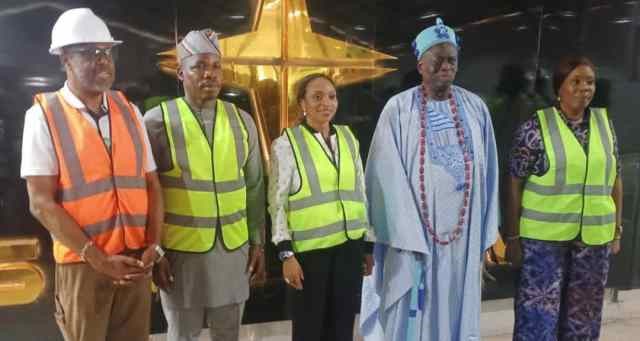Photo Caption
L-R: The Chief Executive Officer of SAGLEV, Dr Gbenga Faleye; Director General of the National Automotive Design and Development Council (NADDC), Joseph Osanipin; Minister of Industry, Trade and Investment, Dr Jumoke Oduwole; Traditional Ruler of Imota, Kabiyesi Mudashiru Ajibade Bakare-Agoro and Lagos State Commissioner for Commerce, Cooperatives, Trade and Investment (CCIT), Mrs. Folashade Kaosarat Ambrose during a tour of SAGLEV Electric Vehicle (EV) Assembly and Manufacturing facility at Imota, Ikorodu, Lagos on Wednesday
Minister of Minister of Industry, Trade, and Investment, Dr. Jumoke Oduwole, has reiterated that President Bola Tinubu is committed to the Nigeria First mandate of the federal government. She made this remark during a tour of the SAGLEV Electric vehicle assembly plant in Ikorodu, Lagos on Wednesday, July 30, 2025.
SAGLEV Electromobility Company Limited is Nigeria’s premier manufacturer and assembler of electric vehicles, dedicated to advancing e-mobility solutions through innovation, sustainability, and locally driven impact.
Headquartered in Lagos, SAGLEV is committed to transforming transportation across West Africa.
The Minister who was accompanied to the visit by the Director General of the National Automotive Design and Development Council (NADDC), Mr. Joseph Osanipin, said “The Nigeria First Policy of President Bola Ahmed Tinubu is committed to supporting investors exactly like the demographics we are seeing here.
“As you know we had the domestic investors’ summit last week, focusing on medium to large sized enterprises. You will know that this project has been five years in the making. The investors have committed significant funds and what you have seen is an offshoot of years of planning, years of training, years of collaboration and partnership and now you have the fruits of it.
“This administration from industrial policy, to trade policy is focused on Nigerian investors and putting them first so that they can thrive.”
She added that “This is affordable, this is sustainable, this is what can really jumpstart our transportation logistics businesses. So from a business perspective, there are affordable vehicles. There is also opportunity for credit which young Nigerians can look at it.
“We will continue to deliver workable reforms for small and medium sized enterprises as they scale, and manufacturers as they produce, we want them to be competitive.
“These are vehicles that use 80 per cent less of power and it is really what can take Nigeria to the next level, what can take productivity, with projects like coastal road, you know what that is going to mean as a multiplier effect for the Nigerian economy.
“We really need to acknowledge and support investors who have taken the hard road of going through finding land, finding technical partner, going through trade facilitation with our ports, all the reforms that are going right now, making sure they are training young technicians, making sure they are also expanding outside the Nigerian market, exporting to the African Continental Free Trade Area, this is exactly what President Bola Ahmed Tinubu wants to see and how he wants to support domestic investors.”
Director-General of the National Automotive Design and Development Council, Joseph Osanipin, gave updates on the Federal Government’s EV policy progress, stating that the auto electrification framework was already in motion.
“For the auto policy, we have the policy already. But we are moving it from policy to legislation. We’ve done the first and second reviews and are now working with top legal practitioners on drafting. In the next few months, we’ll be ready,” he said.
Also speaking, the Lagos State Commissioner for Commerce, Cooperative, Trade, and Investment, Folashade Ambrose-Medebem, who was also part of the visitors to the plant, pledged the state’s support for the project. She stated that Lagos remained committed to creating an enabling environment for investment through initiatives such as land access, market linkages, and infrastructure support via the Lekki Free Zone and Deep Sea Port.
However, the Managing Director/Chief Executive Officer of Saglev Inc., Sam Faleye, highlighted critical challenges facing the local EV assembly sector, especially with importation.
He said, “We have about five containers of semi-knocked-down kits stuck at the ports, just waiting. Customers have already paid deposits for those vehicles.”
Faleye blamed the bottlenecks on issues with the Nigeria Customs Service’s electronic portal, including wrong HS codes and complicated import processes, calling for urgent reforms to streamline customs procedures for EV parts.
While acknowledging the rigorous licensing and inspection by the NADDC, which he described as helpful in ensuring quality control, the SAGLEV boss urged the government to go a step further by enforcing value addition in EV importation.
He said, “If you’ll bring in electric vehicles, add value; don’t just import them fully built. There’s a huge difference in cost and maintenance compared to internal combustion engine vehicles, and we’re offering Nigerians a better option.”













